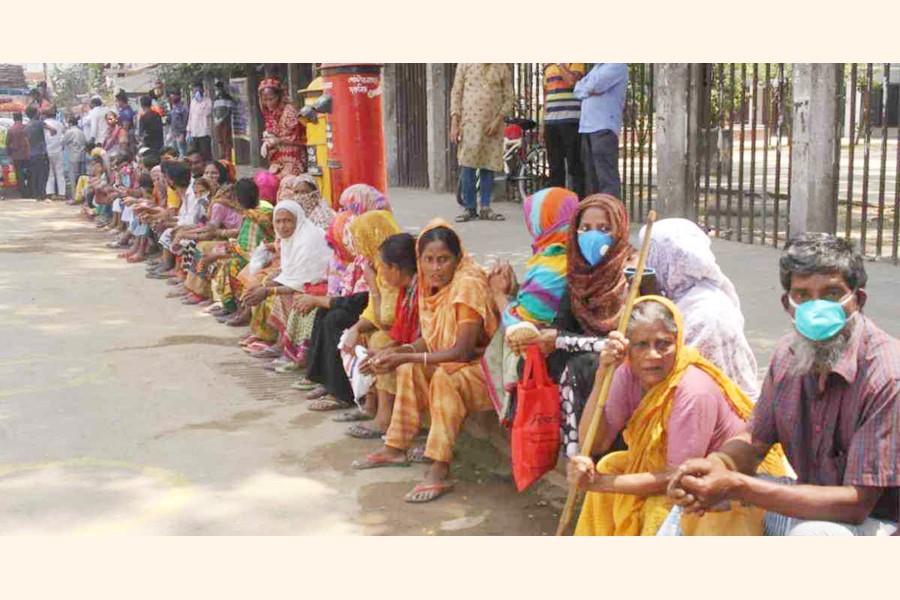The country's poverty situation is becoming truly grim and it might even turn worse due to the ongoing onslaught of floods.
The COVID-19 pandemic by its devastating impact on economic activities has unsettled the process of poverty eradication that has been in place for the last three decades.
The pandemic has not only stalled the poverty reduction trend, it has rather reversed it. Between 1990 and 2020, the rate of poverty in Bangladesh came down to 22 per cent from 45 per cent. During the first two decades, the rate of decline had been higher, by nearly 1.5 per cent per year, on an average. But in the last decade, it slowed down and averaged at around 1.0 per cent a year.
However, as the pandemic is taking its toll on life and livelihood since late March, according to estimates of some local and international organisations, about 40 per cent of the population is now below the poverty line. This is a highly unwelcome trend.
The United Nations Development Programme (UNDP), the UN development agency has faith in the latest poverty estimate. That is why it has suggested the Bangladesh authorities to make available emergency cash assistance to 65.32 million poor at a rate of $25 per month to help the latter overcome the ongoing financial crisis.
Incidentally, the amount suggested by the UNDP is less by Tk 375 than the emergency financial aid now being extended by the government to the people hard-hit by the COVID-triggered severe economic slowdown. Such financial aid is in addition to the assistance being made available to millions of people in rural areas under the government's regular safety net programme.
The government spends an amount equivalent to 2.5 per cent of the country's gross domestic product (GDP) on various social programmes every year. More than half of that amount is dedicated to helping the poor and vulnerable groups under formal safety net programmes. However, the amount disbursed among each of the poor and distressed people is too meagre, less than $10 a month and nearly 1.0 million people are beneficiaries of the safety net. However, there are widespread allegations of irregularities in these programmes.
The number of people receiving the COVID-related emergency assistance is quite small compared to that suggested by the UNDP. The government's assistance, according to a report published in The Financial Express on Saturday, has so far reached 2.4 million poor under the programme. Prime Minister Sheikh Hasina inaugurated it in May last.
The government has a target to make available such assistance to an estimated 5.0 million people.
If the number of people now receiving the regular safety net programmes is excluded from the figure suggested by the UNDP, nearly 60 million people need emergency financial assistance during this trying time of global history. That will be a huge ask on the government coffer, to be honest.
The government will have to spend more than Tk136 billion a month in making available $25 a month to 65.32 million people. If the pandemic lasts, say, for another six months, the total amount will soar to Tk 816 billion. This is beyond the government's fiscal capability.
So, the policymakers might consider expanding the existing target within its capacity under the emergency assistance programme.
Since the government has already relaxed restrictions on economic activities to a large extent even though COVID-19 infections and deaths are continuing without any pause, there will be a certain positive impact on livelihoods. Normalcy in economic activities is returning albeit at a slow pace. Of course, there are risks of things taking a reverse turn in the event of further deterioration of the COVID situation. The government might be forced to clamp a hard lockdown then to contain the disease.
If that happens, the economic recovery process would suffer yet another setback, throwing the poor and low-income people into yet another round of serious sufferings.
It is hard for most people, who are better-off, to understand the plight of the poor, low-income and, in some cases, lower-middle-class people. The poor can at least extend their hands seeking help and support, financial or otherwise, but it is pretty difficult for the lower-middle-class families. So, they are in the most disadvantageous state now.
That families with their household goods dumped on trucks leaving Dhaka for village homes has become more of a common sight these days. Many either have lost jobs or got their income slashed by a big margin. They are finding it difficult to stay in Dhaka. So, with a heavy heart, they are going back to roots with their families. There is none to help them. They will have to wait for a notable improvement in the COVID situation. None knows for sure when that will happen. The best antidote to the COVID pandemic is an appropriate and effective vaccine which is awaited eagerly by billions across the globe.


